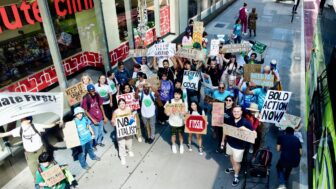For three years, we’ve kept the gas industry at bay in Maryland thanks to supporters like you, and our grassroots pressure continues to pay off. At the April meeting of the governor’s fracking advisory commission on Monday, state agencies presented an updated timeline for their risk studies, which includes a 3-month extension of their original August 1st deadline.
While this delay isn’t the 18-month pause we’ve been advocating for, it’s a step in the right direction and a clear sign that our ever growing movement is having an impact. The extra three months gives the risk study teams more time to get all the facts on the table and ensures public involvement in the process.
Here’s the new timeline:
- April 14th: April Meeting
- Early May: Final draft of the economic risks study released before the May 15th commission meeting. RESI, the study team, will come to the May meeting to present and answer questions.
- May 15th: Commission meeting (To include: presentation by the Regional Economic Studies Institute (RESI) at Towson University on the final economic report; presentation on air pollution; update on risk assessment study)
- End of May/Early June: Final Best Management Practices (BMPs) report released
- June 13: Commission meeting (To include discussions on emergency preparedness; risk assessment; local land use)
- Saturday, June 28th: Public meeting in Garrett or Allegany county. Health study will be presented, then a one month comment period.
- July 11: July Commission meeting (To include: update on health study, risk assessment, and an outline for draft final report)
- July 28th: Health Study Public Comment period closes
- August 18th: Commission meeting (To include: discussion of public health study, content of final draft report)
- Mid/Late August: Draft of final report released by MDE/DNR (One-month comment period on the final report.)
- September 15th: Commission meeting (Content of commission;’ Appendix to final report—Consultation with commission.)
- Mid/Late September: Final Report Public Comment period ends
- Mid October: Final draft of third and final report with response to comments
The commission meeting also included an in depth overview of progress to date from the UMD team completing the health study. You can follow their work here.
And, Dr. Anver Vengosh of Duke University walked the commissioners through his recent findings on underground methane migration from fracked wells to drinking water sources. His study shows that water wells within 1 kilometer (3,280 ft) of a fracked well have significantly higher levels of methane than wells beyond that boundary. Currently, the max proposed setback of fracking wells from drinking wells is only 2,000 ft. Clearly, not enough.
We’ll continue to watchdog the process and call for the strongest possible protections against fracking. Stay tuned for ways you can voice your opinions on this crucial issue for our climate, water, and communities.






